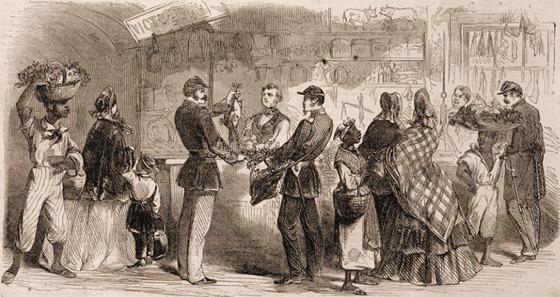
OUR artist, Mr. Davis, some time since sent us a sketch which we reproduce on page 49. It represents our troops in New Orleans “swapping” their rations of flour for tropical fruits and other farm-produce in the markets of New Orleans. Flour has long been extremely scarce at New Orleans; our brave boys, who receive a fair modicum of it daily as part of their ration, manage to dispose of it in market in such a way as, to use their own words, “to live like fighting cocks.” The scene is rather a striking one.
Published January 24, 1863, in Harper’s Weekly
by John Beauchamp Jones
JANUARY 12TH.—The news of the successful defense of Vicksburg is confirmed by an official dispatch, to the effect that the enemy had departed up the Mississippi River. By the late Northern papers, we find they confess to a loss of 4000 men in the several attacks upon the town! Our estimate of their loss did not exceed that many hundred. They lost two generals, Morgan and another. We did not lose a hundred men, according to our accounts. The Herald (N. Y.) calls it “another Fredericksburg affair.”
The estimate of the enemy’s loss, at Murfreesborough, from 12,000 to 20,000, in killed, wounded, and prisoners, and ours at from four to nine thousand. Bragg says he will fight again near the same place, and his men are in high spirits.
Our men fight to kill now, since the emancipation doom has been pronounced. But we have had a hard rain and nightly frosts, which will put an end to campaigning during the remainder of the winter. The fighting will be on the water, or near it.
The legislature is in session, and resolutions inimical to the passport system have already been introduced. But where are State Rights now?
Congress meets to-morrow.
January 12.—Day before yesterday the brigantine J. P. Ellicott, was captured by the rebel privateer Retribution, her officers and crew taken on board the privateer, and a prize crew put in charge of the brigantine. The wife of the mate was left on board the Ellicott, and to-day having succeeded in getting the rebel crew intoxicated, she put them in irons, took possession of the vessel, and piloted it into St. Thomas, where she delivered the rebels and the ship to the United States Consul.—New York Commercial Advertiser.
—Louts Napoleon this day opened the session of the Senate and Corps Législatif of France, with a speech, in which he referred to affairs in America, as follows: “The condition of the Empire would be flourishing if the war in America had not dried up one of the most fruitful sources of our industry. The forced stagnation of labor has caused in many districts an amount of destitution which deserves all our sympathy, and a grant will be asked from you (the legislature) for the support of those who, with resignation, submit to the effects of a misfortune which it is not in our power to stop.
“Nevertheless, I have made the attempt to send beyond the Atlantic advices inspired by a sincere sympathy; but the great maritime Powers not having thought it advisable as yet to act in concert with me. I have been obliged to postpone to a more suitable opportunity the offer of mediation, the object of which was to stop the effusion of blood, and to prevent the exhaustion of a country the future of which cannot be looked upon with indifference.”
—Holly Springs, Miss., was visited by a party of rebel guerrillas, who retired after committing various depredations on the property of the loyalists.—General Banks, at New-Orleans, issued a general order, confirming General Butler’s order of December ninth, 1862, assessing cotton factors and others who had subscribed to the secession fund, for the support of the poor.
Buntyn Station, Monday, Jan. 12. The scouts Sunday were driven back, or rather, hearing the noise of advancing troopers, they withdrew, and this morning, 3:30 A. M. sixteen men, were mounted and sent out under charge of Sergeant Hauxhurst. They scoured the country for nine miles south and returned without seeing any armed person, but reported that they had been seen. They returned at about 11 A. M. Men were detailed to fell trees on the right to protect our flank. Rec’d four papers from home.





